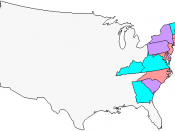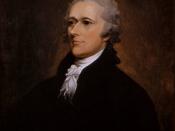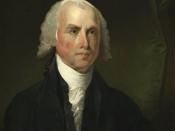Jefferson and Hamilton were both fundamental in the creation of the Constitution and the present government. They both agreed that the government needed some changes, but that is where the similarities ended. Hamilton was the creator of the Federalist Party which represented favor in strong central government, a Federal Bank, and a stable financial system. Jefferson was the creator of the Anti-Federalist Party who did not favor strong central government, and believed in an agrarian economy. Both leaders had influence on the new government and economy of America, but had different view on how it should be run.
Both leaders/groups contributed in the ratification of the Constitution, but interpreted the foundations and articles differently. For example, Jefferson believed that the proposed central government was unconstitutional because it was not written in the Constitution. In Doc. A, Jefferson stated "that all powers not delegated to the U.S. by the Constitution, nor prohibited by it by the states, remain with the people."
Hamilton and the Federalists believed in loose interpretation of the Constitution, so that the central government could become more powerful. An example of this is the foundation of the Bank of the United States in 1789. Hamilton stated in Doc. B, that the Constitution can be decisive when needed. "That the Constitution and the laws of the U.S. made in pursuance of it, and all treaties made... under their authority should be the supreme law of the land."
On the topic of individual liberty and uniting the people; Hamilton and the Federalists, and Jefferson and the Anti-Federalists had different views of this. The disagreement between the two parties would bring about a great outcome that is still in use today, the Bill of Rights. The Federalist's were afraid above all, of disorder, anarchy, and chaos. This reason supported why they...



Great essay
I think this is a great essay, although it would've been much better if u had mentioned Thomas Jefferson's Statute of Religious Freedom.
2 out of 2 people found this comment useful.